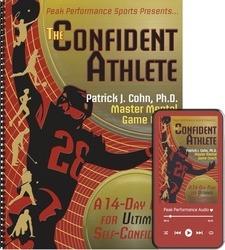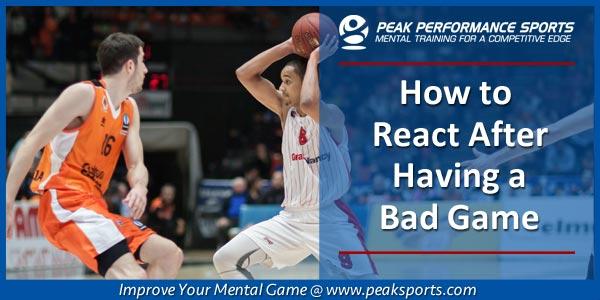Do You Have Positive Self-Talk Or Negative Self-Talk?
Self-talk is the primary determinant of how you perform in a competition.
At no time is self-talk more important than after having a poor game.
The things you say to yourself after a bad performance will determine if one bad game snowballs into the next few games.
If you want to rebound after a bad game, you need to manage your self-talk instead of allowing self-criticism to dominate your mind and ruin your future play.
You can easily talk your way into a slump by saying things such as, “I can’t buy a shot,” “I play bad in the playoffs” or “Here we go again… My bad luck is just going to continue.”
Negative self-talk affects your confidence causing you to second guess your game for fear you will miss again. Negative self-talk leads to lower self-confidence and guarantees another bad game.
Some players think positive self-talk is just a pie-in-the-sky approach, as if they are merely giving themselves a false pep talk.
These players feel positive self-talk is merely a lie they tell themselves and simply does not work.
Positive self-talk is not an attempt to talk yourself into something; positive self-talk is a form of self-coaching.
Your coach has a game plan for how to defend your opponent and win the game. Self-coaching or positive self-talk is a way of defending yourself against negative thoughts in order to play your best and win the mental game.
Kevin Durant of the Oklahoma City Thunder is considered one of the best and most consistent scorers in the NBA…
Durant averaged 28.2 points per game this season with a 50% field goal percentage and averages 28.7 points during the playoffs over his career.
In Game Two of the Thunder’s first round playoff series against the Dallas Mavericks, Durant struggled and shot 7-of-33 as the Thunder lost 85-84.
Durant’s 26 misses were the most he ever had in his professional career. How did he react?
DURANT: “Bad shooting night for me. It’s a part of it. I wish it didn’t happen tonight, but it’s a part of it. Got some great looks all night and just didn’t knock ’em down. Just stick with my routine, don’t do too much extra, and go out there tomorrow and get ready for practice.”
Durant realized his poor performance was an anomaly, not here to stay. Durant knows he is a good shooter and that every player has bad games.
Durant’s self-talk remained positive. Due to his positive self-talk, Durant was able to bounce back in Game Three and finished with 34 points, seven rebounds and three assists to help the Thunder secure the win.
Tip for how to react better to a poor game:
Remember that self-talk can work for you or against you, so you need to control the conversation in your head. Instead of letting your thoughts run wild, consciously remind yourself of three things:
- Everyone has bad games.
- This bad game is not an indication that you have lost your ability.
- Recall your recent performances where you played your best.
Consciously directing the conversation in your head is the key to bouncing back and performing optimally.
Don’t forget to remind yourself of your talents and what you have as an athlete–those things that stay with you no matter what.
Related Sports Psychology Articles
- How This Pro Bounces Back From a Bad Game
- Rebounding After a Bad Performance
- How Do You React To Bad Shots?
*Subscribe to The Sports Psychology Podcast on iTunes
*Subscribe to The Sports Psychology Podcast on Spotify
Download a free sports psychology report to improve your mental game!
Learn more about our one-on-one mental game coaching.
The Confident Athlete

“The Confident Athlete” consists of 2 audio programs that include 14 days of confidence fueling exercises and a simple to follow workbook that guides you through the 14 days, helps you apply the strategies, and customizes the exercises to your personal needs.
Let me help you put a stop to the confidence leak. You can learn to have greater levels of confidence in competition than you do in practice by identifying the specific ways you undermine your own confidence and how to convert your practice confidence into COMPETITIVE CONFIDENCE.
“The Confident Athlete” is a ground-breaking system to teach you how to think like a champion and have ultimate self-confidence every time you step on the playing field, court, track, or course. The confident athletes was developed for any athlete – junior to professional –that wants to gain confidence. However, coaches and sports parents can learn how to teach others to perform with ultimate confidence. Use my program if you want to bust a slump or just wanting higher or more consistent levels of self-confidence.

